Key takeaways:
- The Nobel Prize has faced significant controversies, particularly regarding the credibility of recipients, such as Henry Kissinger and the 1973 Peace Prize awarded to Le Duc Tho.
- There are ongoing concerns about gender and geographic representation, with notable historical omissions of female laureates and voices from underrepresented regions.
- The Nobel Committee has recognized the importance of inclusivity and diversity in nominations, reflecting a commitment to evolving societal values.
- Controversies surrounding the prize encourage broader discussions about the definition of achievement and the role of awards in promoting significant contributions to humanity.
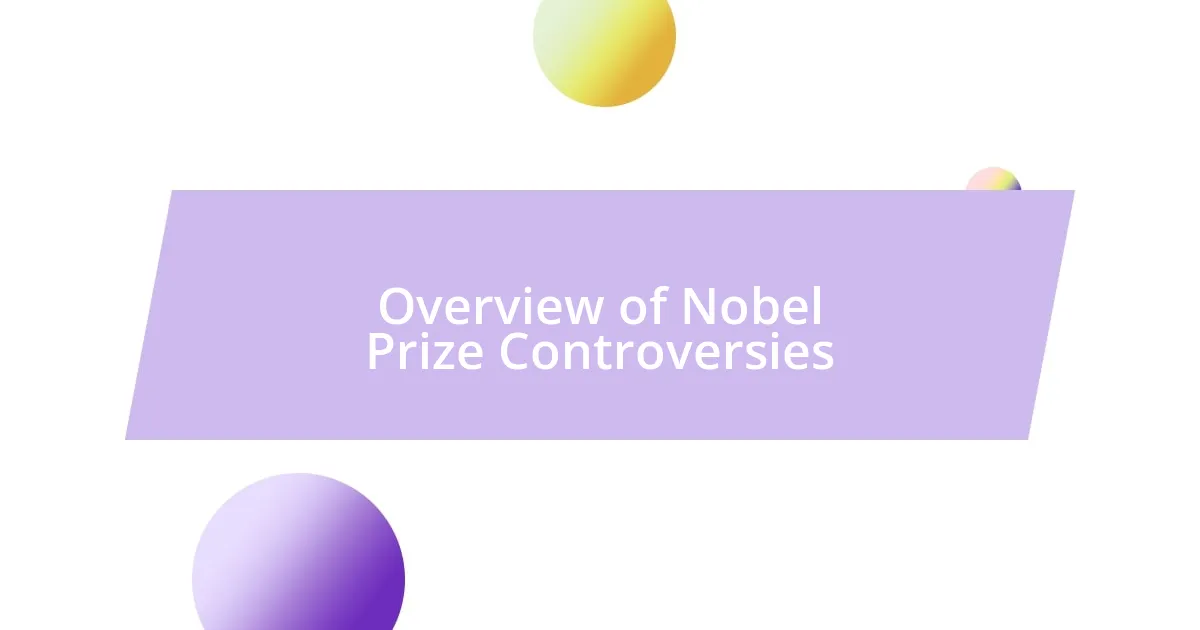
Overview of Nobel Prize Controversies
The Nobel Prize, despite its prestigious reputation, has not been without its share of controversies. Like many, I’ve often wondered how such an esteemed award can create discord rather than unity. It’s fascinating—and a bit disheartening—when I see political influences or biases creeping into the selection process, sometimes overshadowing the true spirit of achievement it aims to celebrate.
One example that always strikes me is the awarding of the Peace Prize to figures who, at times, seem to embody contradictions of their own rhetoric. Take Henry Kissinger, for instance—a recipient known for his controversial policies. I can’t help but ask myself: does this undermine the very purpose of the Nobel Prize? It feels unsettling to consider how actions can sometimes run contrary to the ideals for which a prize is supposedly awarded.
Additionally, the lack of representation across different fields and countries often leaves me pondering the true inclusivity of the Nobel Prizes. It’s hard not to notice that certain voices have been consistently overlooked, which stirs frustration within me. When discussing the contributions of individuals who have been left out, I find myself wondering what their recognition could have meant—not only for them but also for the global conversation around their work.
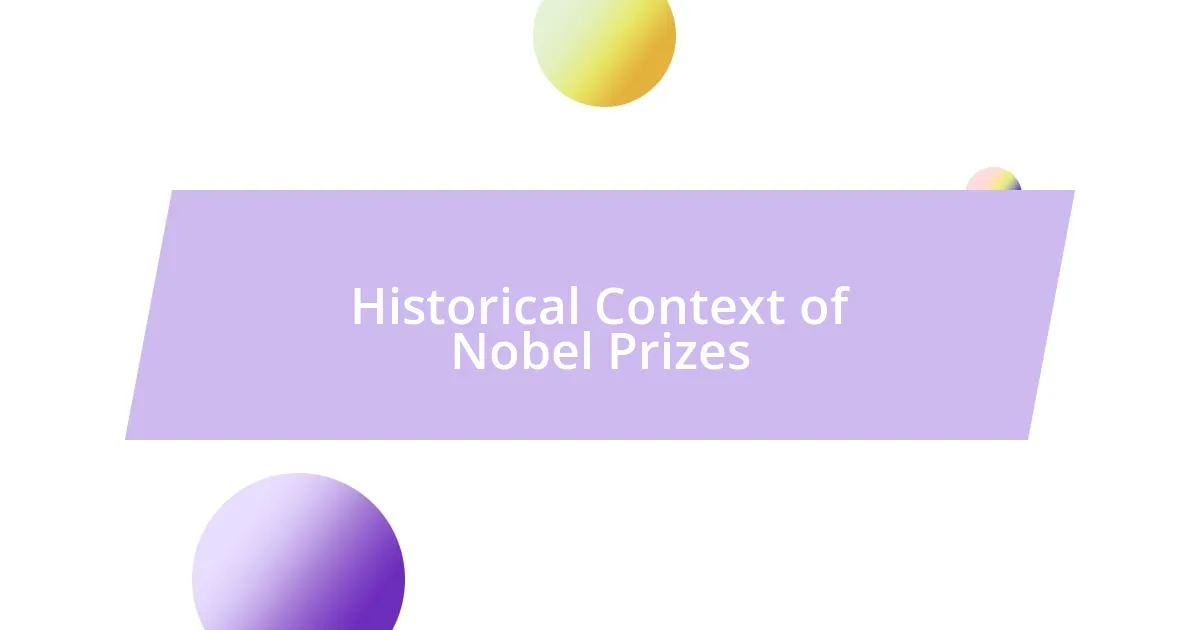
Historical Context of Nobel Prizes
The Nobel Prizes were established in 1895 based on the will of Alfred Nobel, a Swedish inventor and industrialist. Having invented dynamite, Nobel was acutely aware of how technology could be used for both good and ill. This duality fascinates me because it illustrates the complexity of recognizing human achievement; how do we balance moments of brilliance with our moral obligations?
Over the years, the Nobel Prizes have evolved significantly. Initially awarded only in the fields of Physics, Chemistry, Medicine, Literature, and Peace, I find it intriguing how the Nobel Prize in Economic Sciences emerged in 1968, leading us to question—what does it truly mean to ‘honor’ contributions to humanity? In my view, this expansion reflects the ongoing dialogue about what constitutes significant human endeavor and the challenges of capturing that in a single, concise award.
A striking aspect of the historical context is the geographic and gender disparities present in the prize winners. For example, while many prominent male figures have been awarded, I can’t help but note how women have often been overlooked. This discrepancy makes me reflect on the contributions of women scientists like Marie Curie, who not only won in two categories but also paved the way for future generations. It’s a stark reminder of the need for ongoing advocacy for diversity and representation in recognition of excellence.
| Year | Prize |
|---|---|
| 1895 | Establishment of Nobel Prizes |
| 1968 | Nobel Prize in Economic Sciences introduced |
| 1903 | First female winner: Marie Curie |
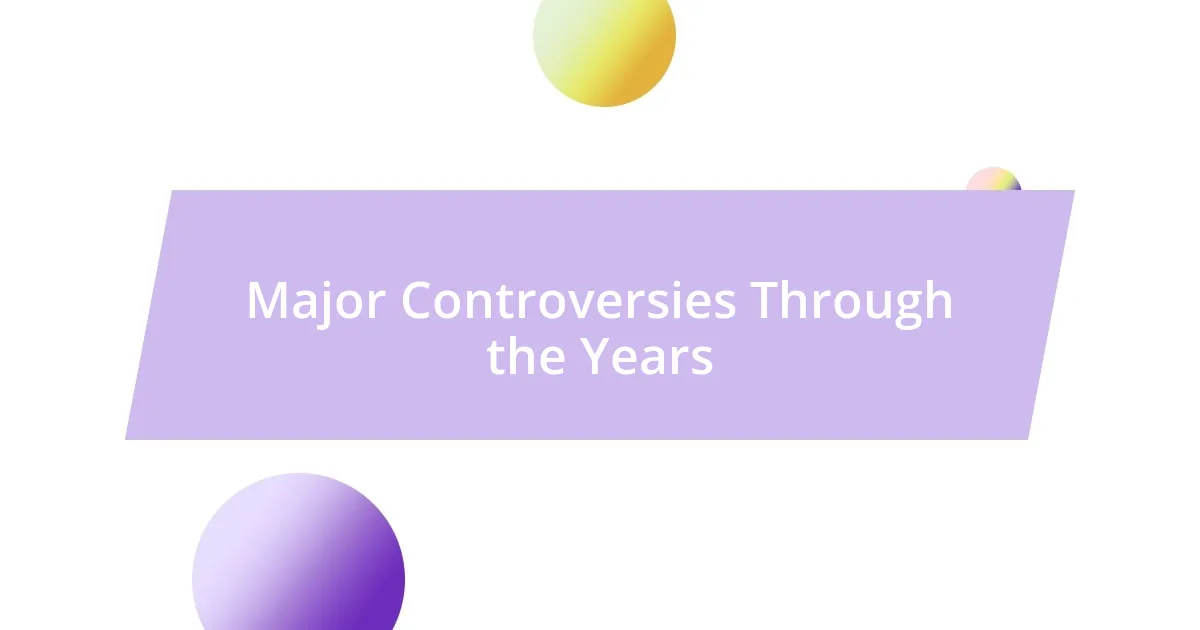
Major Controversies Through the Years
Throughout the years, several Nobel Prize controversies have caught my attention, highlighting the complexities of awarding such a significant honor. For instance, the 1973 Peace Prize awarded to Le Duc Tho for his role in the Vietnam War peace negotiations alongside Henry Kissinger made me question the authenticity of the award. It seemed paradoxical to honor a figure associated with ongoing conflict, leading me to wonder about the motives behind such selections and the actual impact on the intended message of peace.
Here are some noteworthy controversies that stand out:
- Henry Kissinger and Le Duc Tho (1973): Awarded the Peace Prize amid the Vietnam War; critics doubted the legitimacy of honoring figures linked to conflict.
- Bob Dylan (2016): The decision to award the music icon raised eyebrows, sparking debate over whether song lyrics constitute literary achievement.
- J. Michael Bishop and Harold Varmus (1989): Their award for cancer research was overshadowed by accusations of neglecting noteworthy contributions from other researchers.
- The omission of women winners: Over the years, many deserving female scientists were overlooked, leading to discussions about gender bias in prestigious awards.
It’s moments like these that truly resonate with me, illustrating the broader conversations regarding who gets to be recognized in fields that shape our world. Reflecting on these events, I often feel a mix of intrigue and disappointment, underscoring the delicate balance between recognition and the complexities that lie beneath such esteemed symbols.
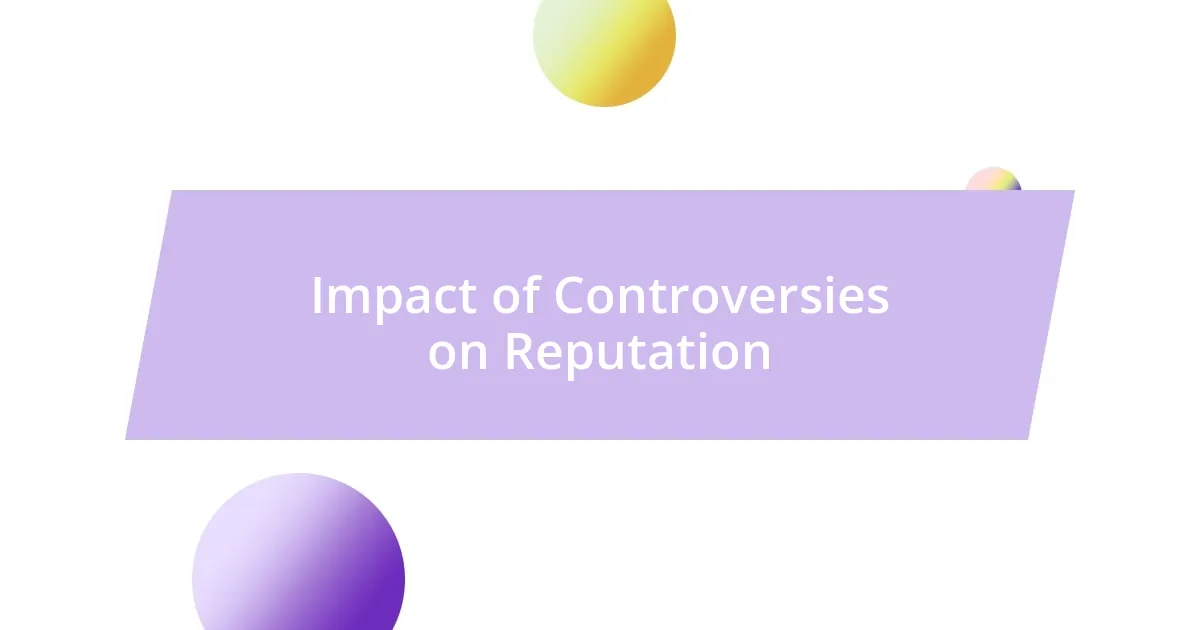
Impact of Controversies on Reputation
Controversies surrounding the Nobel Prize can significantly tarnish its reputation. I remember a conversation I had with a friend who was disillusioned by the 2016 award to Bob Dylan. We pondered whether song lyrics could truly equate to literary achievement. Such debates may dilute the perceived value of the prize, bringing into question the criteria for what constitutes a Nobel-worthy contribution.
Moreover, the backlash against controversial selections often leads to a cascading effect on the credibility of the awards themselves. When figures like Kissinger receive a nod for peace efforts amid ongoing conflict, it raises eyebrows and fuels skepticism. Personally, I’ve felt compelled to dive deeper into the reasoning behind such decisions, considering whether the Nobel Committee’s choices reflect a genuine commitment to its ideals or simply a public relations gamble.
The ongoing discourse surrounding these controversies also highlights the importance of trust in the awarding process. I’ve noticed that repeated missteps can alienate potential recipients and the public alike. When the conversation shifts to who is deserving of recognition, it forces me to ask: Are we truly celebrating impactful contributions, or are we merely engaging in a popularity contest? This is where I see the profound impact of controversies—they challenge the very fabric of what the Nobel Prizes stand for.
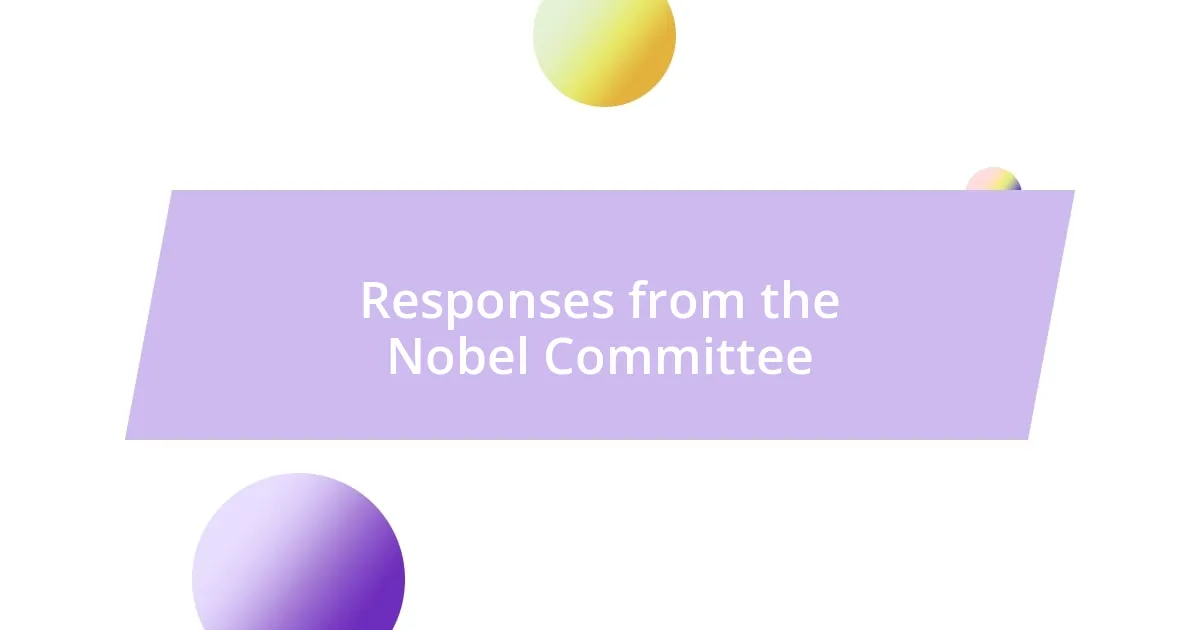
Responses from the Nobel Committee
The Nobel Committee’s responses to controversies often highlight their commitment to transparency and reflection. For example, I recall reading about discussions following the backlash against the awarding of the Peace Prize to Kofi Annan and the UN in 2001. They acknowledged the complexities of global diplomacy and emphasized that recognizing collective efforts sometimes outweighs individual contributions. This made me wonder: can an award ever truly encapsulate the nuances of such vast issues?
Moreover, when the topic of gender bias arose due to the historical neglect of female laureates, the Committee seemed to take note. They began issuing reports detailing efforts to improve diversity among nominees. Owning up to their past, I think, is a significant step. If I were in their position, I would also grapple with the question: How do we ensure that deserving voices don’t go unheard in future selections?
Interestingly, their occasional refusals to engage in certain controversies, like the criticism of awarding authors such as Bob Dylan, reflects their belief in broadening the definition of artistry. In my view, this stance may invite debate but also challenges us to think beyond conventional boundaries. As I ponder this, I feel a mix of curiosity and hope—hope that the Committee will continue evolving and engaging in meaningful dialogues about its choices.

Lessons Learned from Controversies
Controversies surrounding the Nobel Prize often serve as a mirror reflecting society’s evolving values. I remember watching a documentary about the debates following the award to Liu Xiaobo, which sparked conversations about freedom of expression and government oppression. It made me realize how these discrepancies between idealism and reality can push us to confront uncomfortable truths about our global landscape and the role awards play in it.
From my perspective, one of the most significant lessons is the need for inclusivity in the selection process. I recall attending a lecture where the speaker passionately discussed the historical exclusion of women and minority voices from the Nobel discussions. It hit me that when certain perspectives are consistently overlooked, we lose a more comprehensive understanding of contributions to humanity. This realization underscores the importance of fostering dialogue that embraces diverse experiences.
Moreover, I find it fascinating how each controversy can prompt broader discussions about cultural values and priorities. I once engaged in a heated debate with friends about whether a prize should prioritize humanitarian efforts or artistic achievement. That night, as we unraveled our differing views, it became clear to me that such disagreements are not trivial—they’re vital. These conversations not only enrich our understanding of the Nobel Prize but also encourage a more profound appreciation for what it signifies in the grand spectrum of human achievement.














